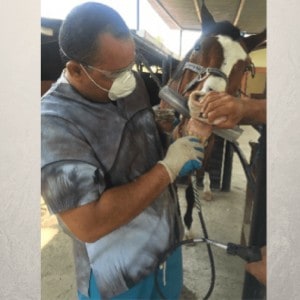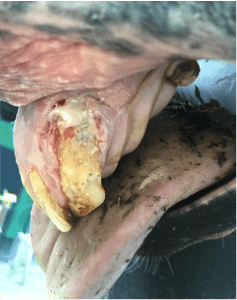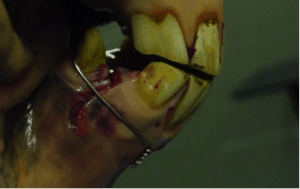
By: Dr. Oscar Henriquez
Introduction
The equine teeth unlike the human grows continuously throughout the life of the horse, at a rate of approximately 3 mm. a year. This is so because the horse in natural conditions 15 to 18 graze a few hours a day which means a lot of wear to the tooth. At present, the tendency is to provide a lot of grain, hay and little natural grass, which gives improper wear to the tooth.
In this regard, it is necessary to highlight some special features to the horses: in the first place, there are hipsodontos, that is to say, that their teeth have a permanent growth throughout life; in the second place, the type of chewing is in shearing (or lateralized).
Chewing 1 kg of grain is of 800 to 1000 cycles of chewing.
Chewing 1 kg. Hay is 3000 to 3500 cycles of chewing.
This means that an animal fed grain or hay chews 10,000 times instead of the 40,000 that a horse fed by grazing.
Another difference is that in a natural pasture, the concentration of grain of grass does not exceed 1.76% of the total intake.
Physiology of Mastication
The function of the teeth in horses, it is the understanding of food and chewing of the same, to form the bolus to be swallowed, thus initiating the process of digestion.
- A) Problem: The horse produces about 10 to 12 liters of saliva a day. This saliva is characterized because it does not have amylase, which is an enzyme that would digest starch by breaking down the molecules of this in two or more molecules of glucose. This is a problem of digestibility when the horse eats large amounts of food rich in starches such as cereal grains.
- B) Problem: is located in the small size of the stomach. Pets of 12 to 15 liters but its functionality ideal is not more than 7 or 8 liters.
- C) Problem: The secretion of acid in the stomach hydrochloride is continuous because it is assumed that the horse in natural conditions of continuous mode, therefore need this acid in continuous mode. If there is no food in the stomach, acid attacks the walls producing ulcers.
Nutrition and feeding
The daily nutritional requirements of horses are based on the needs of protein, energy, vitamins, minerals and water, that allow you to perform a specific job the horse to achieve their genetic and physical skills. The daily requirements vary according to age, size, and reproductive status of the horse.
The colts in growth consume small amounts of food, but they require more protein, energy, calcium and phosphorus that adult horses in percentages.
Grains are cereals, sweet foods and manufactured foods. This food you can buy in bags made for each stage of the life of a horse, whether feed for foals in development or for adult horses.
What should I feed my horse?
The power of the horses can be divided into two categories:
- Grass
The most natural food for horses is the grass of good quality. They are herbivorous animals very selective and need a large area to meet their nutritional needs.
- Hay
It is the staple of the domestic horse, but before you buy it, must be inspected carefully. Always ensure that the bales are green and free of dust and mold, also enter a hand toward the center of a bale and check to ensure that it is hot. Feed a horse with moldy hay can cause colic and dusty hay can cause respiratory problems.
The nutrition we accomplish with the macros (calcium, phosphorus, potassium, etc.)
And moligdeno micro (zinc, cobalt, etc.), these elements are to be found in the concentrates of different qualities.
Among the advances of dentistry.
The equine dentistry has taken a great importance as veterinarians we have been made aware of the importance of a good teeth and little by little we have been preparing and trasmitiendolo The farmer, among the main developments are:
- Fillings: This has been very important as it helps us to save a tooth.
- Removal of pre-molars, molars and canines: for they need a special technique and an instrument of special tweezers for removal
- CIRCLAJES FOR FRACTURES IN JAWS: This helps us to sustain the portion that has been affected in the jaw.
Conclusions
In this article I wanted to emphasize that the digestion begins in the mouth, if we don’t have a good teeth we have a poor absorption of nutrients and therefore the horse does not improve physically.
When a dental leveling to achieve that the horse will improve physical and sport. The ration of concentrate is decreased by which we have a savings in their pockets.
Developed by DR. Oscar Henriquez
Contact: +503 79887649



